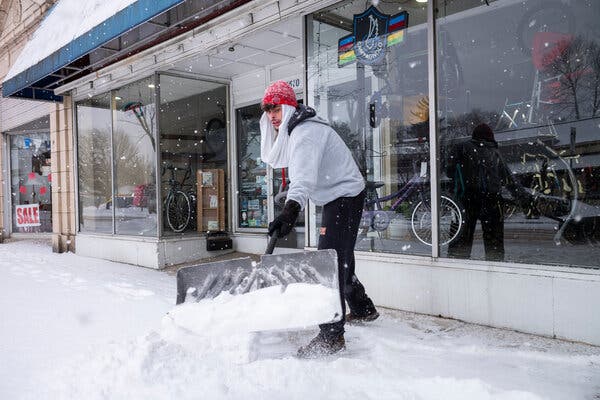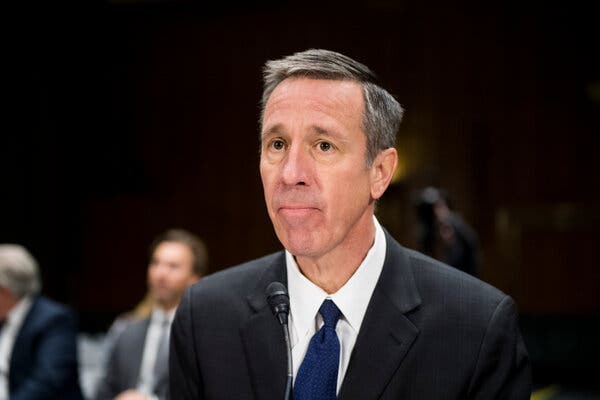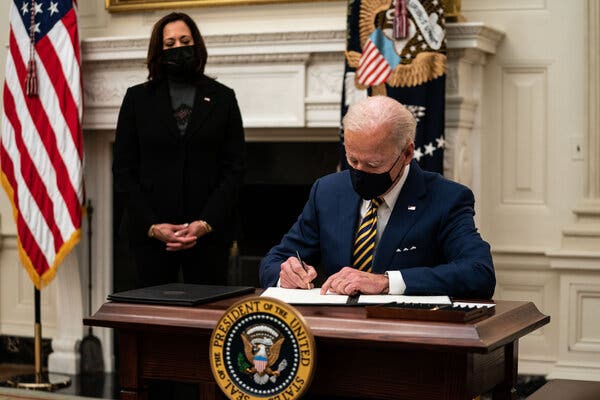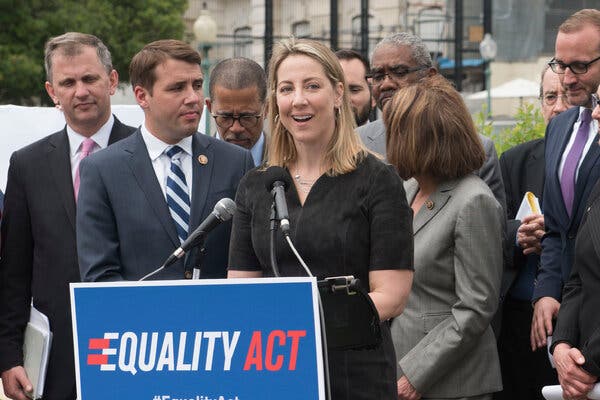Automakers have been forced to idle factories or suspend shifts because of the winter storm that has disrupted the energy system across much of the country this week.
Ford Motor closed a plant near Kansas City, Mo., this week because of the extreme cold and a shortage of natural gas in the Midwest. The plant produces the F-150, Ford’s popular pickup truck, which is one of the industry’s best-selling vehicles.
General Motors said Tuesday that it was not affected by the natural gas shortage but that it was still suspending the first shift at four plants in Tennessee, Indiana, Kentucky and Texas because of “the significant winter weather conditions.”
And Toyota Motor canceled the first of its two shifts at its pickup truck plant in San Antonio, Texas, because of the winter storm and energy disruptions it caused.
Managers of the electricity grid in Texas and elsewhere have had to order rolling blackouts after many power plants were forced offline because they could not get natural gas. Some wind turbines also shut down. At the same time, demand for electricity and natural gas has shot up because of the cold weather. In addition, icy conditions have made it difficult for people to get around.
“To ensure we minimize our use of natural gas that is critical to people’s homes, we decided to cancel operations for a week, beginning Saturday, Feb. 13,” a Ford spokeswoman said in a statement on Monday.
The company doesn’t plan to resume normal operations at the shuttered plant, which is in Claycomo, Mo., until Monday, Feb. 22. The plant employs about 7,300 people. Union workers will be paid 75 percent of their gross pay for the week.
The shutdowns come as Ford, G.M. and other automakers have separately had to idle plants because of a global semiconductor shortage. The chip shortage is expected to reduce the profit of automakers by billions of dollars this year.

The winter storm that barreled across Texas and other states this weekend has severely disrupted business across much of the country, including those that Americans are deeply reliant on for the basic necessities, like retail stores and package delivery services.
Walmart has closed 500 stores in the Midwest, according to a map that was being updated in real time on the company’s website. “The safety of our associates and customers is our top priority,” the company said in a statement.
The storm has caused delays across the vast package delivery networks that many people now rely on as shopping has shifted online.
FedEx said winter weather had caused “substantial disruptions” at its Memphis hub, which is the company’s largest center, occupying 800 acres, and is normally capable of sorting nearly half a million documents and packages an hour. FedEx added that delays were possible across the United States for Tuesday deliveries.
UPS said weather could cause delays in areas not directly hit by the storms. Packages may take longer to get from one place to another, and many delivery services have big sorting hubs in the middle of the country to serve both the east and west coasts. Two of UPS’s main air hubs are in Louisville, Ky. and Dallas, for example.
The winter storm prompted the United States Postal Service closed post offices, processing hubs and other facilities in Texas and Mississippi, according to its website. Power outages had suspended service at main post office in Dallas and a processing office in Beaumont, which is east of Houston near the Louisiana state line.
The storm has also affected Amazon, which operates its own large delivery network that includes planes, hubs and delivery vans. The company’s delivery locations in San Antonio, Texas, had been closed because of bad weather, it told a local TV station.

Arne Sorenson, the president and chief executive of Marriott International, died on Monday at the age of 62. He had been undergoing treatment for pancreatic cancer.
Mr. Sorenson became the third chief executive of Marriott in 2012, and the first without the Marriott surname. Mr. Sorenson led the expansion of the company’s presence worldwide, including the $13 billion acquisition of Starwood Hotels & Resorts in 2015.
“Arne was an exceptional executive — but more than that — he was an exceptional human being,” J.W. Marriott Jr., the company’s executive chairman, said in a statement. “Arne loved every aspect of this business and relished time spent touring our hotels and meeting associates around the world.”
In May 2019, the hotel chain announced that Mr. Sorenson learned had cancer, and earlier this month said that he would be reducing his schedule because of more demanding treatment.
When Mr. Sorenson stepped back from full-time management, the company appointed two Marriott executives, Stephanie Linnartz and Tony Capuano, to temporarily fill the role. The company expects to appoint a new chief executive within the next two weeks.

Energy prices in the United States rose on Tuesday after a huge winter storm hit the southern and central parts of the country, with 150 million people under storm warnings. Millions of people have been left without power in freezing temperatures.
Natural gas futures for March delivery rose as much as 6.3 percent, the biggest jump since Feb. 1, when a storm hit the Northeast. Demand for natural gas has risen, but disruption from the storm means gas production has plummeted.
The energy regulator in Texas said on Saturday that it was aware local natural gas distributors “may be required to pay extraordinarily high prices in the market for natural gas, and may be subjected to other extraordinary expenses” in responding to the storm.
For oil, futures jumped more than 5 percent over the weekend as the coldest weather in three decades interrupted road transportation and some wells had to shut down. On Tuesday, West Texas Intermediate, the U.S. benchmark, rose 0.6 percent to $59.81 a barrel, the highest in 13 months. Futures for Brent crude, the European benchmark, fell 0.5 percent. The largest refineries in the country, including Port Arthur in Texas, closed on Monday because the weather had led to power outages across the state.
“Some producers, especially in the Permian Basin and Panhandle, are experiencing unprecedented freezing conditions which caused concerns for employee safety and affected production,” the Texas energy regulator said Monday.
Markets in the United States were closed on Monday for the Presidents’ Day holiday.
U.S. markets
-
U.S. stocks pushed higher on Tuesday, building on recent gains as investor were optimistic that the vaccination rollout would spur an economic recovery. The S&P 500, which reached a record high last week, and the tech-heavy Nasdaq were mostly unchanged by midday.
-
The Biden administration on Tuesday announced additional relief for American homeowners struggling with payments, saying the pandemic had “triggered a housing affordability crisis.”
Europe
-
The Stoxx Europe 600 index fell 0.1 percent. In Germany, the ZEW survey of investor sentiment recorded a big jump in future expectations for the economy, but the view of the current situation worsened.
-
In Britain, the government reached its target of vaccinating 15 million people, the most vulnerable in the country, by mid-February but now the prime minister, Boris Johnson, is under increasing pressure to lay out a clear plan for the end of the long lockdown. The central bank has forecast a relatively strong economic rebound later in the year, but business leaders have warned that companies need to prepare to reopen and the recovery could be impeded if they are given enough support. The pound rose above $1.39 this week, the strongest against the U.S. dollar since early 2018.
Asia
-
Indexes in Asia rose, with the Nikkei 225 in Japan up 1.3 percent; on Monday, it climbed above 30,000 for the first time since 1990. The Hang Seng in Hong Kong closed 1.9 percent higher.
-
Softbank’s shares closed at a record high. Last week, the Japanese company recorded huge profits in its tech investment fund amid a flurry of public offerings by companies it backs.

The Biden administration on Tuesday announced additional relief for American homeowners struggling with payments, saying the pandemic had “triggered a housing affordability crisis.”
The actions include:
-
extending a moratorium on foreclosures through June 30;
-
extending an enrollment window for mortgage payment forbearance requests until June 30; and
-
providing up to six months of additional mortgage payment forbearance for borrowers who entered forbearance on or before June 30.
On his first day in office, President Biden issued orders extending federal moratoriums on some foreclosures and evictions through the end of March. But the expiration of those protections would leave “many at risk of falling further into debt and losing their homes,” White House officials said in a statement.
One in five renters have fallen behind on rent and more than 10 million homeowners are behind on mortgage payments, according to the White House statement. People of color, who face greater hardship in the pandemic, are at greater risk of eviction and foreclosure.
Homeowners can find out who owns their mortgage by entering their address on various government websites.
The relief programs are part of a coordinated effort by the Department of Housing and Urban Development, Department of Veterans Affairs and Department of Agriculture.

The cryptocurrency Bitcoin, which has been rising meteorically of late, hit $50,000 on Tuesday morning, a new high, before dipping to about $49,500.
The digital currency is minting new millionaires as excitement grows around Bitcoin’s prospects for mainstream acceptance. Tesla announced last week that it invested $1.5 billion in Bitcoin, followed by news that institutional investors, like BNY Mellon, the oldest bank in the United States, were making the jump into Bitcoin.
Now, corporations can’t avoid the question of whether they will also invest. MicroStrategy’s chief executive, Michael Saylor, is recruiting companies to follow MicroStrategy’s path and invest in Bitcoin to guard against deflation of the dollar. But not everyone shares his certainty: Uber may take payments in crypto but won’t invest its cash in Bitcoin, the company’s chief executive, Dara Khosrowshahi, said.
Celebrity investors, like Tesla’s chief executive, Elon Musk, appear intent on cultivating mainstream crypto curiosity. Mr. Musk recently added Bitcoin to his Twitter bio, which pushed the asset’s price higher. On Monday, the Mexican billionaire Ricardo Salinas Pliego also added Bitcoin to his Twitter bio; he has been an enthusiast since 2013 and paid $200 for his first Bitcoin. The move follows exhortations from famous crypto fans, like Russell Okung of the Carolina Panthers National Football League team, who last month urged people on Twitter to “plant the flag and show you’re ready for the future.”
The business interest has prompted politicians to push for Bitcoin’s acceptance. Last week, Mayor Francis Suarez of Miami proposed that the city pay municipal workers and accept fees for city services in Bitcoin, and the city voted to study the suggestion. Andrew Yang, a New York mayoral candidate, promised to make the Big Apple the best place for crypto businesses. Senator Cynthia Lummis, Republican of Wyoming, has been boasting about her state’s fintech-friendly regulations and is hoping that Mr. Musk accepts her invitation to bring his business there.
Bitcoin critics warn, however, that investors should be wary. “Elon Musk may be buying it, but that doesn’t mean everyone else should follow suit,” the New York University economist Nouriel Roubini said last week.
Not everyone is a fan. Nassim Nicholas Taleb, a mathematical statistician — an expert on randomness, probability and uncertainty — is now dumping his Bitcoin. “I’ve been getting rid of my BTC. Why? A currency is never supposed to be more volatile than what you buy and sell with it,” he recently wrote.

When Niki Christoff, a senior Salesforce executive, received an offer to join the board of a publicly traded company, she saw it as a signal that she was poised to break into a club long dominated by men. But what happened next revealed one of the biggest challenges facing companies’ efforts to diversify their boards, writes our columnist Andrew Ross Sorkin.
Many companies, like Salesforce, don’t allow employees to join external boards alongside their day jobs, and especially not those below the senior-most ranks, where women and ethnic and racial minorities tend to be better represented. When Ms. Christoff asked for permission, she was rebuffed, and when she accepted the directorship, she was fired.
Mr. Sorkin describes the obstacle this presents:
With so many employees trying to overcome barriers to promotions at their own employers, this creates a kind of systemic impediment to diversifying boardrooms.
And with companies facing growing calls from investors and society to diversify their boards, a new fault line is being exposed in corporate America: Should companies let their managers spread their wings?
Ms. Christoff is eager to bring attention to the issue. “People don’t know that these policies exist, and it’s not just Salesforce that has this policy,” she said. “It’s not uncommon to restrict board service to senior management. And so highlighting that issue to me feels important both from an equity perspective, but also from a business perspective.”

Private lawsuits are adding to the mounting legal pressure on Big Tech companies.
Already, more than 10 suits echoing government antitrust cases have been filed against Google, Facebook or both in recent months. Many of them lean on evidence unearthed by the government investigations, writes David McCabe for The New York Times.
If successful, the lawsuits could be costly for Facebook and Google. The companies work with millions of advertisers and publishers every year, and Google hosts apps from scores of developers, meaning there are many potential litigants. After the United States sued Microsoft for antitrust violations a generation ago, the company paid $750 million to settle with AOL, at that point the owner of the browser Netscape, which was at the core of the government’s case.
“There’s a fair amount of scrambling going on and folks trying to figure out what private suits might be successful and how to bring them,” said Joshua Davis, a professor at the University of San Francisco’s law school.
Facebook declined to comment about the lawsuits. Julie Tarallo McAlister, a spokeswoman for Google, said in a statement that the company would defend itself against the claims.
“Like other claims courts have rejected in the past, these complaints try to substitute litigation for competition on the merits,” she said.
The private suits follow similar ones from the government for a simple reason: Regulators have distinct advantages when it comes to obtaining evidence. Federal and state investigators can collect internal documents and interview executives before filing a suit. As a result, their complaints are filled with insider knowledge about the companies. Private individuals can seek that kind of evidence only after they file lawsuits.
If the government cases succeed against Google or Facebook at trial, it is likely to bolster the case for private lawsuits, experts said. Lawyers could point to those victories as evidence the company broke the law and move quickly to their primary aim: obtaining monetary damages.






